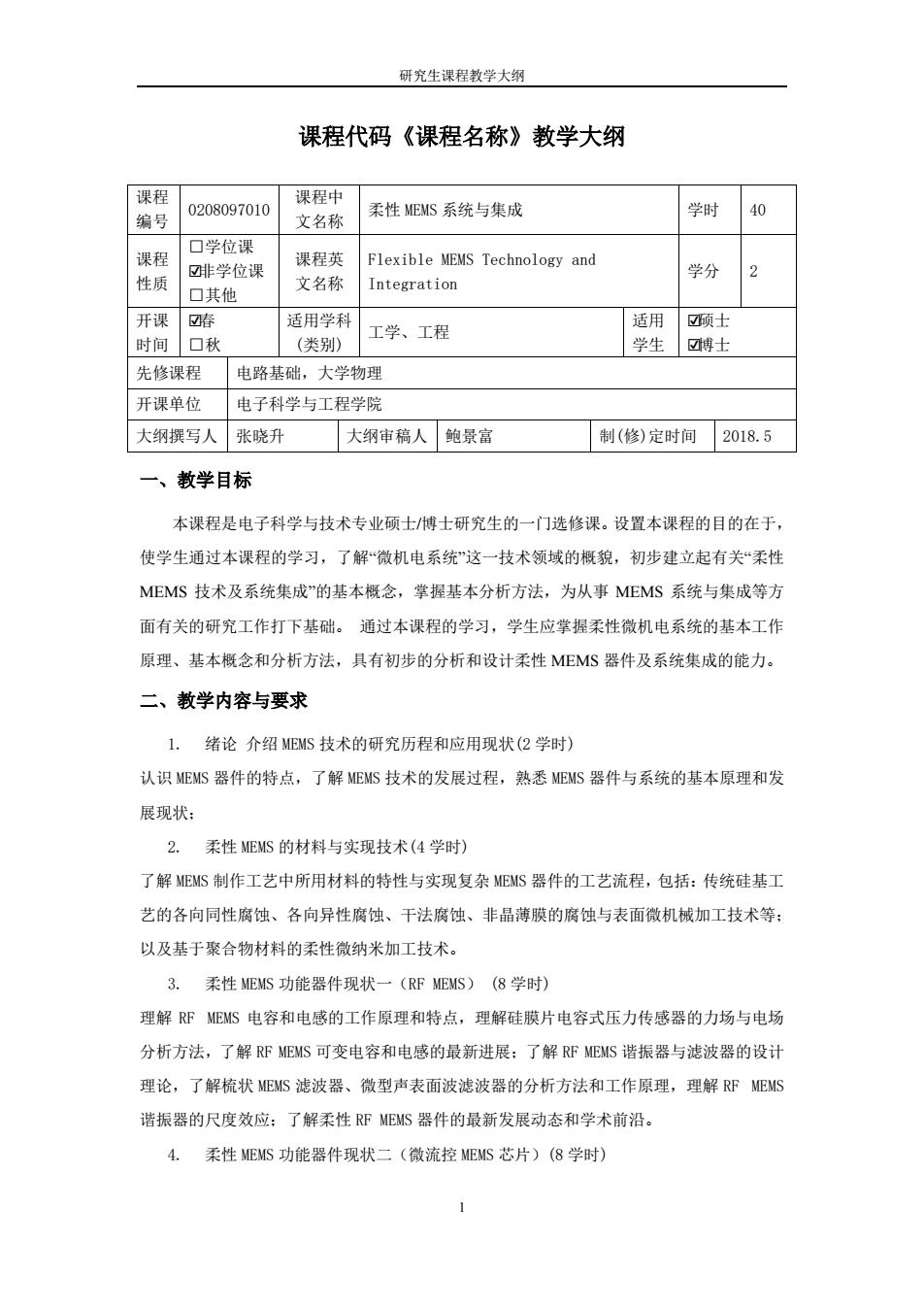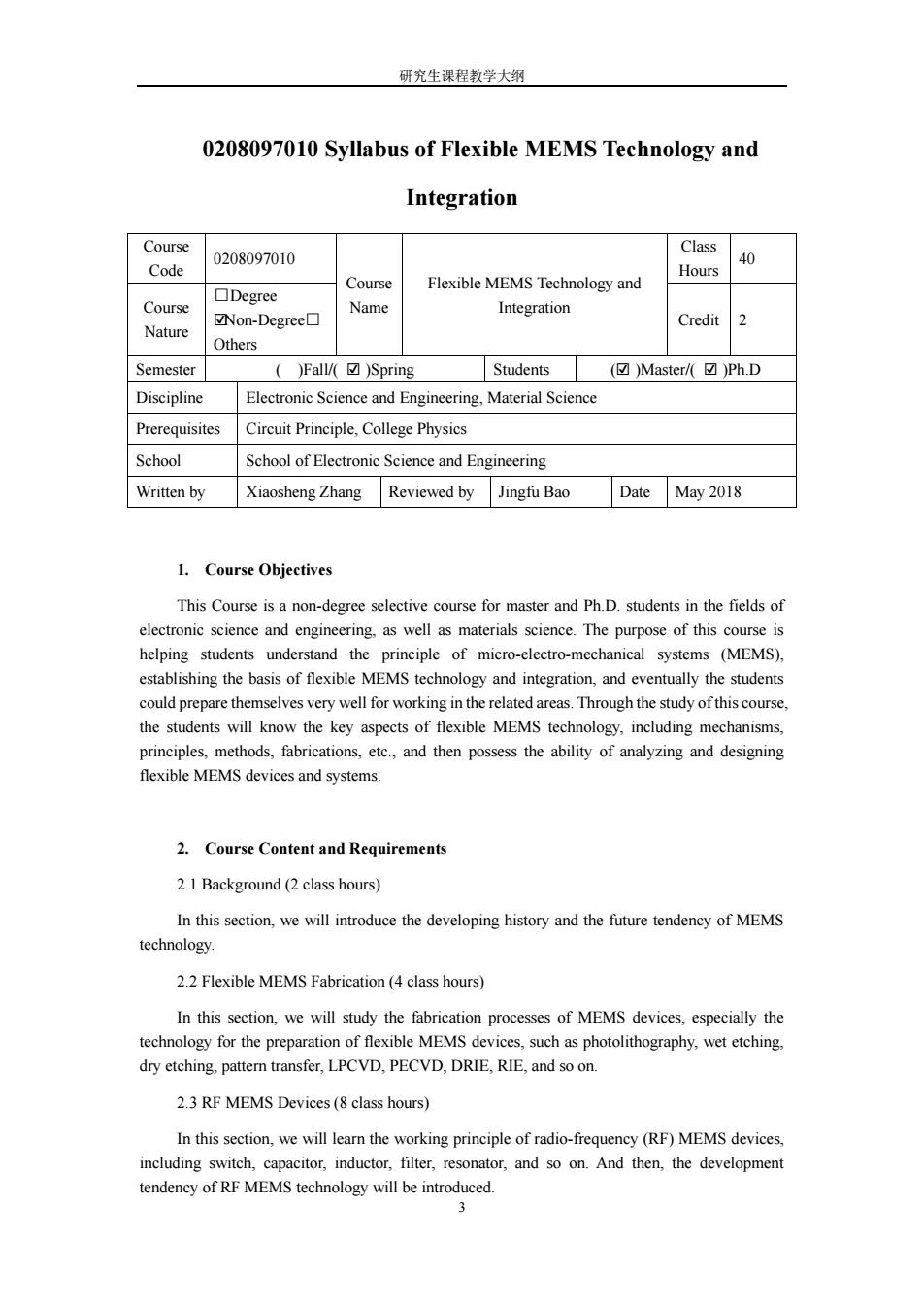
研究生课程教学大纲 课程代码《课程名称》教学大纲 课程 课程中 0208097010 柔性MEMS系统与集成 学时 40 编号 文名称 口学位课 课程 ☑啡学位课 课程英 Flexible MEMS Technology and 性质 文名称 学分 2 口其他 Integration 开课 ☑春 适用学科 适用 ☑项士 工学、工程 时间口秋 (类别) 学生 ☑博士 先修课程 电路基础,大学物理 开课单位 电子科学与工程学院 大纲撰写人 张晓升 大纲审稿人 鲍景富 制(修)定时间 2018.5 一、教学目标 本课程是电子科学与技术专业硕士/博士研究生的一门选修课。设置本课程的目的在于, 使学生通过本课程的学习,了解“微机电系统”这一技术领域的概貌,初步建立起有关“柔性 MEMS技术及系统集成”的基本概念,掌握基本分析方法,为从事MEMS系统与集成等方 面有关的研究工作打下基础。通过本课程的学习,学生应掌握柔性微机电系统的基本工作 原理、基本概念和分析方法,具有初步的分析和设计柔性MEMS器件及系统集成的能力。 二、教学内容与要求 1.绪论介绍MEMS技术的研究历程和应用现状(2学时) 认识MEMS器件的特点,了解MEMS技术的发展过程,熟悉MEMS器件与系统的基本原理和发 展现状: 2. 柔性MEMS的材料与实现技术(4学时) 了解MEMS制作工艺中所用材料的特性与实现复杂MEMS器件的工艺流程,包括:传统硅基工 艺的各向同性腐蚀、各向异性腐蚀、干法腐蚀、非晶薄膜的腐蚀与表面微机械加工技术等: 以及基于聚合物材料的柔性微纳米加工技术。 3.柔性MEMS功能器件现状一(RF MEMS)(8学时) 理解RF MEMS电容和电感的工作原理和特点,理解硅膜片电容式压力传感器的力场与电场 分析方法,了解RF MEMS可变电容和电感的最新进展:了解RF MEMS谐振器与滤波器的设计 理论,了解梳状MEMS滤波器、微型声表面波滤波器的分析方法和工作原理,理解RF MEMS 谐振器的尺度效应:了解柔性RF MEMS器件的最新发展动态和学术前沿。 4.柔性MEMS功能器件现状二(微流控MEMS芯片)(8学时)
研究生课程教学大纲 1 课程代码《课程名称》教学大纲 课程 编号 0208097010 课程中 文名称 柔性 MEMS 系统与集成 学时 40 课程 性质 □学位课 ☑非学位课 □其他 课程英 文名称 Flexible MEMS Technology and Integration 学分 2 开课 时间 ☑春 □秋 适用学科 (类别) 工学、工程 适用 学生 ☑硕士 ☑博士 先修课程 电路基础,大学物理 开课单位 电子科学与工程学院 大纲撰写人 张晓升 大纲审稿人 鲍景富 制(修)定时间 2018.5 一、教学目标 本课程是电子科学与技术专业硕士/博士研究生的一门选修课。设置本课程的目的在于, 使学生通过本课程的学习,了解“微机电系统”这一技术领域的概貌,初步建立起有关“柔性 MEMS 技术及系统集成”的基本概念,掌握基本分析方法,为从事 MEMS 系统与集成等方 面有关的研究工作打下基础。 通过本课程的学习,学生应掌握柔性微机电系统的基本工作 原理、基本概念和分析方法,具有初步的分析和设计柔性 MEMS 器件及系统集成的能力。 二、教学内容与要求 1. 绪论 介绍 MEMS 技术的研究历程和应用现状(2 学时) 认识 MEMS 器件的特点,了解 MEMS 技术的发展过程,熟悉 MEMS 器件与系统的基本原理和发 展现状; 2. 柔性 MEMS 的材料与实现技术(4 学时) 了解 MEMS 制作工艺中所用材料的特性与实现复杂 MEMS 器件的工艺流程,包括:传统硅基工 艺的各向同性腐蚀、各向异性腐蚀、干法腐蚀、非晶薄膜的腐蚀与表面微机械加工技术等; 以及基于聚合物材料的柔性微纳米加工技术。 3. 柔性 MEMS 功能器件现状一(RF MEMS) (8 学时) 理解 RF MEMS 电容和电感的工作原理和特点,理解硅膜片电容式压力传感器的力场与电场 分析方法,了解 RF MEMS 可变电容和电感的最新进展;了解 RF MEMS 谐振器与滤波器的设计 理论,了解梳状 MEMS 滤波器、微型声表面波滤波器的分析方法和工作原理,理解 RF MEMS 谐振器的尺度效应;了解柔性 RF MEMS 器件的最新发展动态和学术前沿。 4. 柔性 MEMS 功能器件现状二(微流控 MEMS 芯片)(8 学时)

研究生课程教学大纲 了解微流控MEMS技术的发展现状,理解微纳尺度MEMS流控芯片的工作原理和特点,了解 DA芯片,芯片实验室,微进样技术,微热力学等多个技术方向的最新发展动态,理解柔性 基底上微阀、毛细管电泳等关键微流控器件的工作原理与制备技术。 5.柔性MEMS功能器件现状三(光学MEMS器件)(6学时)》 掌握光学MEMS器件的工作原理与集成制造技术,理解微反射镜、微透镜、微棱镜、光栅、 衍射光学元件、FP干涉仪等光学MEMS关键器件的构造与工作原理。 6.柔性MEMS能量采集技术(8学时) 了解微纳能源采集技术基础及其前沿发展,理解自供能微系统的基本概念和前沿发展。掌握 基于压电、电磁、光电、热释电、摩擦生电等原理所实现的柔性MEMS能量采集器,理解在 微纳米尺度上实现人体和环境的能量采集,将微纳能源采集技术与微纳机电系统进行功能复 合,实现具有自驱动、自供能能力的新型微纳机电系统。 7.MEMS微系统的封装与集成(4学时) 了解MEMS领域的几种常见的封装与集成的工艺流程,熟悉MEMS封装的可靠性分析方法和 常用的几种检测方法。 三、教学方式 课程采取课堂授课和课程设计相结合的教学方式。 四、考核方式与成绩评定 考核方式:一页纸开卷 成绩评定:平时考核成绩与期末考试成绩各占50%。 五、教材及主要参考书目 教材: [1]Gregory T.A.Kovacs.Micromachined Transducers Sourcebook [M].McGraw-Hill Science, 1998. 参考资料: [1山张海霞,缪旻,方东明.射频微机电系统的理论、设计、制备及应用M.科学出版 社,2014 [2]王中林(著).王中林,秦勇,胡又凡(译).自驱动系统中的纳米发电机M.科 学出版社,2012 2
研究生课程教学大纲 2 了解微流控 MEMS 技术的发展现状,理解微纳尺度 MEMS 流控芯片的工作原理和特点,了解 DNA 芯片,芯片实验室,微进样技术,微热力学等多个技术方向的最新发展动态,理解柔性 基底上微阀、毛细管电泳等关键微流控器件的工作原理与制备技术。 5. 柔性 MEMS 功能器件现状三(光学 MEMS 器件)(6 学时) 掌握光学 MEMS 器件的工作原理与集成制造技术,理解微反射镜、微透镜、微棱镜、光栅、 衍射光学元件、FP 干涉仪等光学 MEMS 关键器件的构造与工作原理。 6. 柔性 MEMS 能量采集技术 (8 学时) 了解微纳能源采集技术基础及其前沿发展,理解自供能微系统的基本概念和前沿发展。掌握 基于压电、电磁、光电、热释电、摩擦生电等原理所实现的柔性 MEMS 能量采集器,理解在 微纳米尺度上实现人体和环境的能量采集,将微纳能源采集技术与微纳机电系统进行功能复 合,实现具有自驱动、自供能能力的新型微纳机电系统。 7. MEMS 微系统的封装与集成(4 学时) 了解 MEMS 领域的几种常见的封装与集成的工艺流程,熟悉 MEMS 封装的可靠性分析方法和 常用的几种检测方法。 三、教学方式 课程采取课堂授课和课程设计相结合的教学方式。 四、考核方式与成绩评定 考核方式:一页纸开卷 成绩评定:平时考核成绩与期末考试成绩各占 50%。 五、教材及主要参考书目 教材: [1] Gregory T.A.Kovacs. Micromachined Transducers Sourcebook [M]. McGraw-Hill Science, 1998. 参考资料: [1] 张海霞,缪旻,方东明. 射频微机电系统的理论、设计、制备及应用 [M]. 科学出版 社,2014. [2] 王中林(著). 王中林,秦勇,胡又凡 (译). 自驱动系统中的纳米发电机 [M]. 科 学出版社,2012

研究生课程教学大纲 0208097010 Syllabus of Flexible MEMS Technology and Integration Course Class 0208097010 40 Code Hours Course Flexible MEMS Technology and Course ▣Degree Name Integration ☑Non-Degreel☐ Credit 2 Nature Others Semester ( )Fal/(☑)Spring Students (☑)Master/(☑)Ph.D Discipline Electronic Science and Engineering,Material Science Prerequisites Circuit Principle,College Physics School School of Electronic Science and Engineering Written by Xiaosheng Zhang Reviewed by Jingfu Bao Date May 2018 1.Course Objectives This Course is a non-degree selective course for master and Ph.D.students in the fields of electronic science and engineering,as well as materials science.The purpose of this course is helping students understand the principle of micro-electro-mechanical systems (MEMS), establishing the basis of flexible MEMS technology and integration,and eventually the students could prepare themselves very well for working in the related areas.Through the study of this course, the students will know the key aspects of flexible MEMS technology,including mechanisms, principles,methods,fabrications,etc.,and then possess the ability of analyzing and designing flexible MEMS devices and systems. 2.Course Content and Requirements 2.1 Background(2 class hours) In this section,we will introduce the developing history and the future tendency of MEMS technology 2.2 Flexible MEMS Fabrication(4 class hours) In this section,we will study the fabrication processes of MEMS devices,especially the technology for the preparation of flexible MEMS devices,such as photolithography,wet etching, dry etching,pattern transfer,LPCVD,PECVD,DRIE,RIE,and so on. 2.3 RF MEMS Devices(8 class hours) In this section,we will learn the working principle of radio-frequency (RF)MEMS devices, including switch,capacitor,inductor,filter,resonator,and so on.And then,the development tendency of RF MEMS technology will be introduced. 3
研究生课程教学大纲 3 0208097010 Syllabus of Flexible MEMS Technology and Integration Course Code 0208097010 Course Name Flexible MEMS Technology and Integration Class Hours 40 Course Nature □Degree ☑Non-Degree□ Others Credit 2 Semester ( )Fall/( ☑ )Spring Students (☑ )Master/( ☑ )Ph.D Discipline Electronic Science and Engineering, Material Science Prerequisites Circuit Principle, College Physics School School of Electronic Science and Engineering Written by Xiaosheng Zhang Reviewed by Jingfu Bao Date May 2018 1. Course Objectives This Course is a non-degree selective course for master and Ph.D. students in the fields of electronic science and engineering, as well as materials science. The purpose of this course is helping students understand the principle of micro-electro-mechanical systems (MEMS), establishing the basis of flexible MEMS technology and integration, and eventually the students could prepare themselves very well for working in the related areas. Through the study of this course, the students will know the key aspects of flexible MEMS technology, including mechanisms, principles, methods, fabrications, etc., and then possess the ability of analyzing and designing flexible MEMS devices and systems. 2. Course Content and Requirements 2.1 Background (2 class hours) In this section, we will introduce the developing history and the future tendency of MEMS technology. 2.2 Flexible MEMS Fabrication (4 class hours) In this section, we will study the fabrication processes of MEMS devices, especially the technology for the preparation of flexible MEMS devices, such as photolithography, wet etching, dry etching, pattern transfer, LPCVD, PECVD, DRIE, RIE, and so on. 2.3 RF MEMS Devices (8 class hours) In this section, we will learn the working principle of radio-frequency (RF) MEMS devices, including switch, capacitor, inductor, filter, resonator, and so on. And then, the development tendency of RF MEMS technology will be introduced

研究生课程教学大纲 2.4 Microfluidic MEMS Devices(8 class hours) In this section,we will study the mechanisms of microscale and nanoscale fluidic devices, including DNA analysis chip,microTAS,micropump,microvalve,etc. 2.5 Optical MEMS Devices(6 class hours) In this section,we will learn the typical devices of optical MEMS,such as micro-mirror, micro-grating,micro-lens,optical switch,etc. 2.6 Flexible Micro/Nano Energy Harvesting(8 class hour) In this section,we will study the principles of micro/nano energy harvesting technology,and several typical techniques will be introduced.The micro/nano energy harvesters based on piezoelectric effect,electromagnetic effect,photovoltaic effect,triboelectric effect will be systematically studied. 2.7 Package and Integration(4 class hours) Eventually,we will learn the package and integration technology of MEMS devices. 3.Teaching Methods Class teaching+Project training 4.Evaluation and Grading Final exam:One-page-open test Score:50%presence check and group project+50%final exam 5.Teaching Materials &References(Including Author,Title,Publisher and Publishing Time) [1]Gregory T.A.Kovacs.Micromachined Transducers Sourcebook [M].McGraw-Hill Science, 1998. 参考资料: [1山张海霞,缪旻,方东明.射频微机电系统的理论、设计、制备及应用M.科学出版 社,2014 [2]王中林(著).王中林,秦勇,胡又凡(译).自驱动系统中的纳米发电机M.科 学出版社,2012. 4
研究生课程教学大纲 4 2.4 Microfluidic MEMS Devices (8 class hours) In this section, we will study the mechanisms of microscale and nanoscale fluidic devices, including DNA analysis chip, microTAS, micropump, microvalve, etc. 2.5 Optical MEMS Devices (6 class hours) In this section, we will learn the typical devices of optical MEMS, such as micro-mirror, micro-grating, micro-lens, optical switch, etc. 2.6 Flexible Micro/Nano Energy Harvesting (8 class hour) In this section, we will study the principles of micro/nano energy harvesting technology, and several typical techniques will be introduced. The micro/nano energy harvesters based on piezoelectric effect, electromagnetic effect, photovoltaic effect, triboelectric effect will be systematically studied. 2.7 Package and Integration (4 class hours) Eventually, we will learn the package and integration technology of MEMS devices. 3. Teaching Methods Class teaching + Project training 4. Evaluation and Grading Final exam: One-page-open test Score: 50% presence check and group project + 50% final exam 5. Teaching Materials &References (Including Author, Title, Publisher and Publishing Time) [1] Gregory T.A.Kovacs. Micromachined Transducers Sourcebook [M]. McGraw-Hill Science, 1998. 参考资料: [1] 张海霞,缪旻,方东明. 射频微机电系统的理论、设计、制备及应用 [M]. 科学出版 社,2014. [2] 王中林(著). 王中林,秦勇,胡又凡 (译). 自驱动系统中的纳米发电机 [M]. 科 学出版社,2012